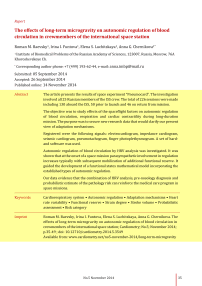The effects of long-term microgravity on autonomic regulation of blood circulation in crewmembers of the international space station
Автор: Baevsky Roman М., Funtova Irina I., Luchitskaya Еlena S., Chernikova Аnna G.
Журнал: Cardiometry @cardiometry
Рубрика: Report
Статья в выпуске: 5, 2014 года.
Бесплатный доступ
The article presents the results of space experiment “Pneumocard”. The investigation involved all 25 Russian members of the ISS crew. The total of 226 sessions were made including 130 aboard the ISS, 50 prior to launch and 46 on return from mission. The objective was to study effects of the spaceflight factors on autonomic regulation of blood circulation, respiration and cardiac contractility during long-duration mission. The purpose was to secure new research data that would clarify our present view of adaptation mechanisms. Registered were the following signals: electrocardiogram, impedance cardiogram, seismic cardiogram, pneumotachogram, finger photoplethysmogram. A set of hard- and software was used. Autonomic regulation of blood circulation by HRV analysis was investigated. It was shown that at the onset of a space mission parasympathetic involvement in regulation increases typically with subsequent mobilization of additional functional reserve. It guided the development of a functional states mathematical model incorporating the established types of autonomic regulation. Our data evidence that the combination of HRV analysis, pre-nosology diagnosis and probabilistic estimate of the pathology risk can reinforce the medical care program in space missions.
Cardiorespiratory system, autonomic regulation, adaptation mechanisms, heart rate variability, functional reserve, strain degree, stroke volume, probabilistic assessment, risk category
Короткий адрес: https://sciup.org/148308787
ID: 148308787
Список литературы The effects of long-term microgravity on autonomic regulation of blood circulation in crewmembers of the international space station
- Baevsky RM, Nikulina GА, Funtova II, Chernikova АG. Autonomic regulation of blood circulation. Orbital station “Mir”. 2001;2:36-68. [in Russian]
- Baevsky RM, Funtova II, Gharib G. Role of sympathetic regulation in maintaining cardiovascular homeostasis in the conditions of long-term microgravity. Proc. 12th Conf. on Space Biology and Aerospace Med; 2002; Moscow. 39 p. [in Russian]
- Baevsky RM, Funtova II, Diedrich A, Chernikova AG, Tank J. Autonomic function testing aboard the ISS using «PNEUMOCARD». 58-th Congress IAA; 2007 September; Haydarabad, India.
- Baranov VM, Baevsky RM, Drescher J, Tank J, et al. Investigations of the cardiovascular and respiratory systems on board the international space station: Experiments “Puls” and “Pneumocard. 53rd Congress IAF; 2002 October; Houston, USA.
- Baevsky RM, Baranov VM, Bogomolov VV, et al. Prospects of development of the medical control automated systems at the ISS on the basis of onboard equipment «Pulse» and «Pneumocard». 2003; 54 IAC; Bremen.
- Baevsky RM, Luchitskaya ES, Funtova II, Chernikova АG. Investigation of autonomic regulation of blood circulation in long-duration space flight. Fiziologiya. 2013.
- Parin VV, Baevsky RM, Volkov YN, Gazenko ОG. Space cardiology. Leningrad: Meditsina; 1967. 206p. [in Russian]
- Baevsky RM, Kirillov ОI, Kletskin SZ. Mathematical analysis of changes in cardiac rhythm under stress. Moscow: Nauka; 1984. 235 p. [in Russian]
- Heart rate variability. Standards of measurement, physiological interpretation and clinical use. Circulation. 1996;93:1043-1065.
- Baevsky RM, Ivanov GG, Chireikin LV, et al. Heart rate variability analysis with the use of different electrocardiographic systems. Vestnik Aritmologii. 2001;24:69-85. [in Russian]
- Grigoriev АI, Baevsky RM. Health concept and space medicine. Moscow: Slovo; 2007. 208 p. [in Russian]
- Kaznacheev VP, Baevsky RM, Berseneva АP. Pre-nosology diagnosis in practice of mass population screening. Leningrad: Meditsina, 1980. 196 p. [in Russian]
- Baevsky RM, Berseneva АP. Introduction in pre-nosology diagnosis. Moscow: Slovo; 2008. 208 p. [in Russian]
- Chernikova АG. Assessment of the functional state of organism in long-duration space flight with the use of heart rate variability analysis [thesis]. Мoscow; 2010. 24 p. [in Russian]
- Baevsky RM, Chernikova АG. On the problem of the physiological norm: mathematical model of the functional states on the basis of heart rate variability analysis. Aviacosm.Ekolog.Med. 2002;6:11-17. [in Russian]
- Baevsky RM, Bersenev EY, Drescher J, et al. Computer systems for investigating blood circulation and respiration onboard the International space station. Proc. 12th Conf. on Space Biology and Aerospace Med., 2002; Мoscow; p. 38-39. [in Russian]
- Baevsky RM, Funtova II, Diedrich A, Chernikova AG, Drescher J, Baranov VM, Tank J. Cardiac function measured by impedance cardiography is maintained during long term space flight. 59 IAC; 2008; Glasgow, Scotland.
- Funtova II, Chernikova АG, Fedorova IN, Baranov VM, Tank J, Baevsky RM. Some results of scientific experiment “Pneumocard” onboard the ISS. 17th IAA Humans in Space Symposium; 2009 June 7-11; Moscow, Russia. [in Russian]
- Chernikova АG, Baevsky RM, Funtova II. Assessment of the functional state of ISS crewmembers by heart rate variability analysis. 17th IAA Humans in Space Symposium; 2009 June 7-11; Moscow, Russia. [in Russian]
- Funtova II, Baevsky RM, Luchitskaya E, Slepchenkova I, Drescher J, Tank J. Day vs. night time heart rate variability changes in microgravity: experiments “Pneumocard" and “Sonocard". 62nd International Astronautical Congress; 2011; ID: 10491.
- Chernikova AG, Baevsky RM, Funtova II. The probability approach to an estimation of risk of a pathology at cosmonauts according to analysis HRV. ISHNE-2011; 2011 April; Moscow, Russia.


